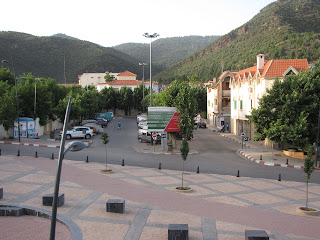My cough was still lingering so we put off the plan to walk in the Atlas mountains until later. Luckily we did as Omar, our neighbour and mountain guide in the Marrakesh apartment, had to go back to his mountain village to visit his sick mother. We could also have made a circuit through Casablanca and Rabat on the coast but decided to try the route known as Trek es Sultan or Royal Road in the Middle Atlas mountains. It was the trading route for slaves, salt, and other goods carried by caravans of camels through the desert from West Africa.
We really enjoyed the bus ride up the mountains through oak, cork and cedar forest. We were lucky enough to catch a glimpse of several barbary apes foraging under the trees close to the road. The light was fading but we were able to see the steep pitched houses on the hills that looked like they were built to handle snow. We could have been travelling through a Swiss, French, or Slovakian mountain village. There were orange tiled rooves and stone walls. It was quite unlike anything we have seen to date in Africa. The French colonial chiefs came here to escape the heat.
We passed through the modern, clean, expensive town of Ifrane. King Hassan 11 with King Fahd of Saudi Arabia, financed the fee paying university here. It has a mosque, synagogue, andChristian church on campus to encourage tolerance between the faiths. All lectures are in English.

We after a two hour bus ride we spent a night in Azrou in a hotel on the main square. The hotel had a small window overlooking the street and we watched the locals enjoying the evening chatting and playing with their kids until around midnight. The room was pretty hot and in the corner of the room was a an old water radiator heater, another thing we haven't seen for a long time.

We checked out the buses at the station at about 11.30pm and had a local with very good English wanting to help us in exchange for a deposit for a bottle of wine!
We joined the men in the morning for breakfast before catching another bus on to Er Rachidia.
It would have been a place we could have stayed longer at, if we had more time. It was relaxed and pleasant.
 Wheat fields
Wheat fields Sheep and goats off to market.
Sheep and goats off to market.
The Berbers are Moroccos original inhabitants. They still speak their ancient languages and recently TV programmes were produced in the Berber language and it is now taught in schools although Arabic is the official language. The Berber herders have their goat hair tents in the fields with their huge herds of goat and sheep.

The storks and their giant nests can be seen perched on power poles, house rooves, or atop the minarets.